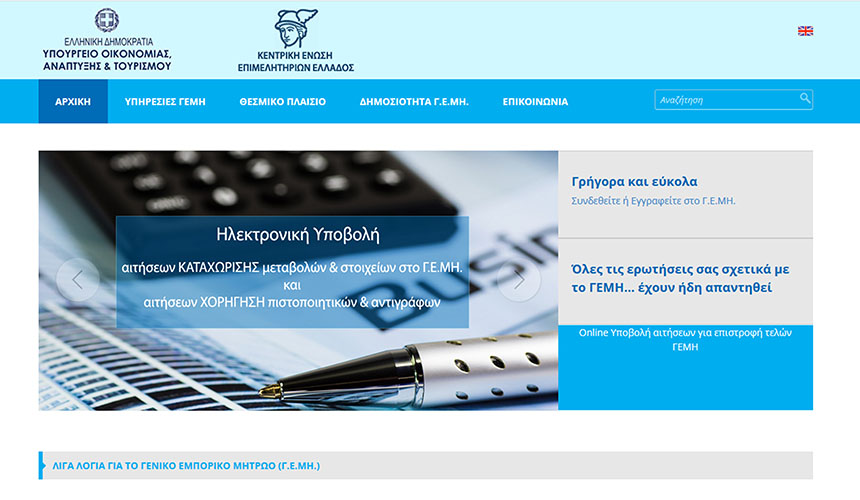The need to establish a single framework for the organization, information and use of the public administration registries has always been a standing requirement regarding transactions with public authorities and broader public sector.
Moreover, many countries worldwide have implemented similar registries as the HOUSE OF COMPANIES (United Kingdom), PUBLIC REGISTER (U.S.A., Singapore) and others. For these countries, the electronic commercial registry of enterprises is a factor of transparency, collateral of transactions (security and reliability) and acceleration of processes and decision making at a business and state level.
Therefore, the enactment of the General Electronic Commercial Registry (Geniko Emboriko Mitroo-G.Ε.ΜH.), in Greece, in conjunction with the upgrading of the role of Chambers through their transformation into “one-stop shops”, are key changes in the axis of simplifying the overall processes of the business environment, which aims at meeting both the needs and demands of any kind involved and the effective use and exploitation of collected information. The operation of a modern and updated central database of business registry will facilitate immeasurably in reducing bureaucratic procedures to create or change a business and also the publication and submission of “corporate information” certificates for almost all transactions of a company. Moreover, a general and single registry of companies creates broader information requirements and operating information for the entire public sector. Thanks to this, it becomes possible to effectively monitor the statistical data of enterprises, the precise exercise of political, legislative or and supervisory power to businesses but also in relation to them.
The project of GEMH aims at radically reforming the functioning of individual (fragmented) registries all legal form of business that is the transition from the current manuscript -primarily- mode of information processing and the current task management to a single automated processing environment and high efficiency of a General Electronic Commercial Registry (Geniko Emboriko Mitroo-G.Ε.ΜH.).
GEMH will be -among other- a body of publicity, statistical analysis at a national level and means of protection for third party both for the General Secretariat of Commerce and the part of the GEMH that concerns it and for the wider public sector, when the entire project will be completed.
Expected Results
The expectant simplification of the typical frame for conducting commercial activity due to the operation of G.E.MH is intended to achieve among others the following objectives:
- Establish a transparency regime for conducting commercial activity.
- Securitize the safety of transactions in general.
- Make commercial activity public in the best possible way.
- Secure prerequisites for legal commercial activity to be conducted and protected.
- Curtail bureaucracy by launching modern communication and information technologies.
- Secure the possibility of serving businesses and citizens quickly by ‘one stop’ procedures and to implement specifications set in article 6 of law 3242/2004.
- Establish a simplified and attractive frame for fostering organized commercial activities from the EU member-states and third countries.
The implementation of GEMH will lead to significant financial and social benefits as described below:
Flexible and fast monitoring of commercial enterprises.
This monitoring pertains to keeping track of and updating automatically changes in all corporate forms (constitution, articles of association, share capital etc.) as well as keeping an analytical record of financial results and obligations of businesses. Keeping a record of the above information enables the monitoring of history of a business and as a result changes can always be monitored (historical data).
Quick issuance of documents (certificatates) which can be easily standardized and extracted from the database. Consequently data asked from Ministries and other bodies will be easier available contributing to the effective and quick use of this data by the relevant bodies.
The competent departments will be able to monitor the reliability of information pertaining to societes anonymes regarding the fulfillment of their obligations in compliance with existing laws. All of the above as well as the entire picture of societes anonyme and other forms of companies (societe anonyme, limited partnership, limited liability company, personal company etc.) available will greatly facilitate the decision making procedure regarding businesses in general and specific businesses particularly.
Control will be easily exercised and decisions for all businesses will be easily taken by competent public bodies with the realization and use of a unified data base which will be used for the exchange of information among respective bodies and interested parties.
Statistical data will be issued which will show precisely the total course of businesses in specific areas. This data will significantly help the state to determine its policy for specifying criteria and methodologies which will help the appropriate distribution of provisions to the field of societe anonyme.
There will be synergies with other projects of the public sector so that information can be shared and used by various public departments and structures of the public sector will be activated and used to achieve economies of scale and better services to the citizen.





